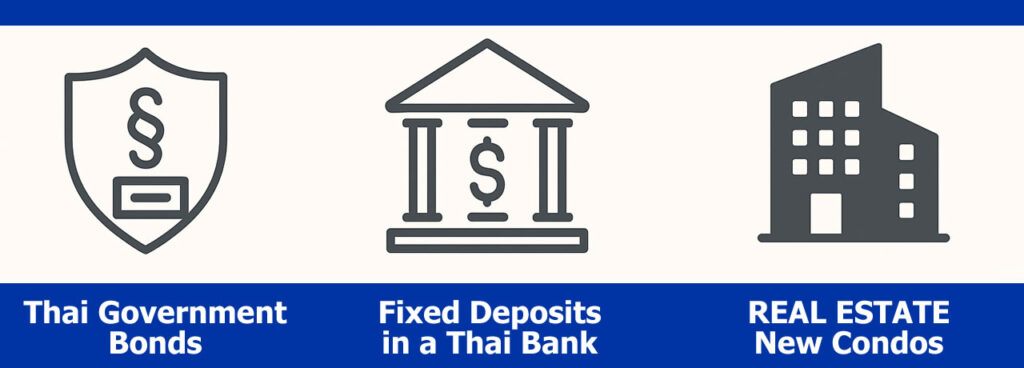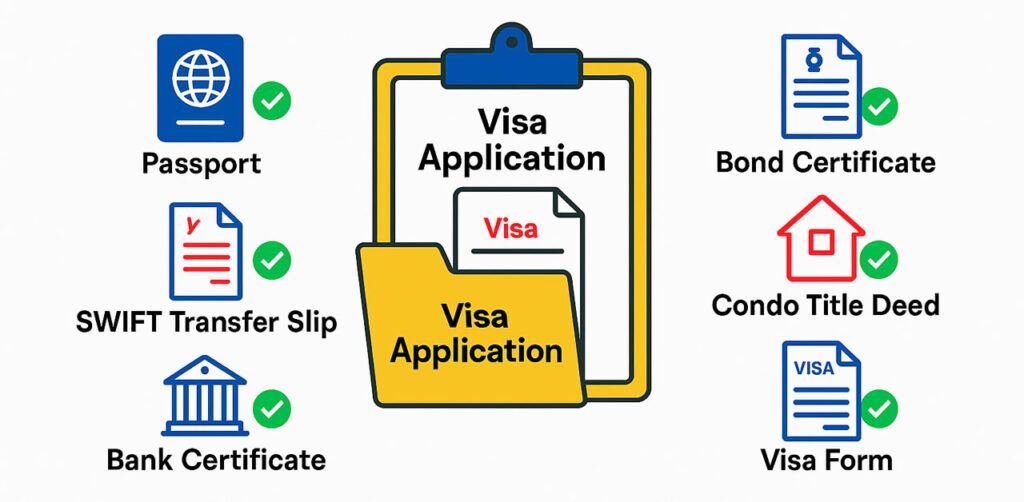
The Thailand Investment Visa (Non-Immigrant “IM”) offers a pathway to long-term residence in Thailand for foreigners who invest at least 10 million Thai baht in approved financial assets or real estate. This visa is designed for those who want to stay in Thailand without working, relying instead on their capital to meet immigration requirements.
It’s a suitable option for individuals with available funds looking to invest in Thai government bonds, fixed deposits, or newly built condominiums. While the visa doesn’t provide work rights or automatic inclusion of family members, it offers a straightforward route to residency for those who meet the investment threshold.
This guide covers everything you need to know about the Investment Visa: eligibility, accepted investment types, the application process, required documents, renewals, and key considerations.
Eligibility Criteria & Investment Options
To qualify for the Thailand Investment Visa, applicants must meet specific financial requirements. The key condition is a minimum investment of 10 million Thai baht (THB) in eligible Thai assets. This investment must be transferred from overseas and held in the applicant’s name.
Minimum Investment Requirement
To be eligible, you must invest a total of 10 million THB or more, using funds transferred from a foreign source. The full amount can be allocated across one or more of the following approved categories:
Accepted Investment Categories
1. Thai Government Bonds
You may invest in bonds issued by the Thai government. These must be:
- Held in your personal name
- Purchased through authorized financial institutions in Thailand
- Maintained throughout the visa period
2. Fixed Deposits in a Thai Bank
You can deposit funds into a fixed-term savings account at a Thai bank. To qualify:
- The bank must operate under the supervision of the Bank of Thailand
- The deposit must remain untouched and in your name
- Interest earned may not count toward the 10M THB requirement
3. Real Estate (New Condominiums Only)
Investment in real estate is permitted, but with strict conditions:
- Must be a newly-built condominium unit
- Purchase must be made directly from a licensed developer
- Leasehold or second-hand (resale) properties do not qualify

Note: All investments must be supported by official documentation, including proof of foreign currency transfer, ownership, and source of funds.
Application Process for the Thailand Investment Visa
Applying for the Thailand Investment Visa requires careful financial planning and strict documentation. Unlike tourist or retirement visas, this category hinges entirely on proof of legitimate investment into approved Thai assets. Below is a step-by-step guide to help you navigate the process with confidence.
Where to Apply
- Outside Thailand: The initial application is typically submitted at a Thai Embassy or Consulate in your home country or country of residence.
- Inside Thailand: In some cases, especially for renewals or converting another valid visa type, applications may be accepted at a local immigration office. However, not all offices handle investment visa cases, so it’s important to confirm in advance.
Tip: Contact the embassy or immigration office beforehand to verify they accept investment visa applications and to request an updated checklist of documents.
Step-by-Step Process
Step 1: Transfer Funds from Abroad
To start, you must transfer a minimum of 10 million THB into Thailand from an overseas account.
- The funds must arrive in foreign currency and be converted into Thai baht by a Thai bank.
- The receiving account must be in your own name.
- You will need to obtain a Foreign Exchange Transaction Form (FETF) or equivalent, issued by the bank, as proof of transfer.
Important: Transferring funds domestically (e.g., from another Thai account or using baht) will not satisfy visa requirements. The origin must be traceable to a foreign source.
Step 2: Make the Investment
Once your funds are in Thailand, allocate them to one or more eligible investment options:
- Thai government bonds
- Fixed deposits with Thai banks (must be under Bank of Thailand supervision)
- Newly built condominium units purchased directly from a developer
Each investment must be documented and remain active throughout the visa duration.
Be sure to get official confirmation for each investment — this includes bond purchase letters, bank certificates for fixed deposits, and condo sale agreements or title deeds.
Step 3: Collect Documentation
This is the most critical part of the process. You must gather official, verifiable documents to prove:
- The source of your funds (e.g., salary, business income, sale of property)
- That the money was transferred from abroad (SWIFT slips, FETF forms)
- That the investment has been made and is active (e.g., government bond certificates, fixed deposit confirmation, condo title deeds or payment receipts)
Keep both digital and printed copies. Thai immigration is detail-oriented and may request additional proof during processing.
Step 4: Submit the Application
Submit your completed application package, which includes:
- All supporting documents
- Completed visa application form
- Recent passport-size photos
- Visa fee payment (varies by location)
Processing Time: Usually ranges from 2 to 4 weeks, depending on the embassy or immigration office. Delays are possible if documents are incomplete or need further verification.
Step 5: Receive Your Visa
If approved, you will receive a Non-Immigrant “IM” Visa, valid for one year. The visa may be issued as:
- Single-entry: You’ll need a re-entry permit each time you leave Thailand.
- Multiple-entry: You can freely exit and re-enter during the visa’s validity period.
If you’re issued a single-entry visa but plan to travel often, consider applying for a multiple re-entry permit shortly after arrival.
Required Documents for the Thailand Investment Visa
When applying for the Thailand Investment Visa, documentation is everything. Immigration officers will closely review every paper you submit, so it’s crucial to prepare thoroughly and ensure all information is accurate, consistent, and complete. Below is a detailed breakdown of what you’ll need, with explanations to help you understand the purpose behind each requirement and how to avoid issues during the application process.
Personal Documents
These are the basic documents required to identify and verify your legal status:
- Valid Passport
Your passport should be valid for at least 6 months from the intended date of entry into Thailand. It must also have a minimum of two blank visa pages for the visa sticker and stamps. If your passport is nearing expiration, it’s advisable to renew it before applying.
- Visa Application Form
You’ll need to complete the correct visa application form (usually available online via the Thai embassy or consulate website). Fill it out carefully and ensure your signature matches your passport.
- Passport-Size Photographs
Most embassies require 4×6 cm color photos with a white background, taken within the last 6 months. Avoid using photos that are older or digitally altered, as they may be rejected.
- TM87 or TM88 Form
These forms are used depending on where you’re applying from:- TM87: For those applying outside Thailand
- TM88: For visa applications within Thailand (such as a visa conversion)
Proof of Investment
Your eligibility is based on making a qualifying investment, and you’ll need to clearly prove that the minimum 10 million THB has been legally invested in one or more approved categories.
For Thai Government Bonds:
- Submit a purchase certificate from the Ministry of Finance or a licensed financial institution
- Include a copy of the bond registration showing the investment is in your name
- Provide evidence that the bond purchase was made after the transfer of funds into Thailand
For Fixed Deposits:
- A confirmation letter from your Thai bank is required, stating the amount, account type, and deposit duration
- A copy of the passbook or account details must show your name and the locked-in amount
- You must also provide a Foreign Exchange Transaction Form (FETF) showing the funds arrived from abroad in foreign currency
For Condominium Purchases:
- Submit the sales and purchase agreement, stamped and signed by the developer
- Include the title deed (Chanote) or a signed contract that proves you are the legal buyer
- You must also submit proof of payment, including SWIFT transfers and official receipts from the developer, to demonstrate that funds came from abroad and were used specifically for the purchase
Tip: Ensure the property is a newly built unit purchased directly from a licensed developer. Resale condos or leasehold purchases are not accepted for this visa type.
Proof of Foreign Fund Transfer
It’s not enough to invest locally—you must prove the money originated from abroad. This demonstrates that the funds are new capital injected into the Thai economy.
Required documents include:
- SWIFT transfer slips that show the transaction from your foreign bank to a Thai account
- Bank confirmation letters verifying receipt of funds
- The FETF form, which is a standard document issued by the receiving Thai bank showing the amount, currency, sender, and purpose of the transfer
- Currency conversion receipts that show the foreign funds were converted into Thai baht
Funds must be transferred directly from your own foreign bank account. Transfers from domestic accounts or third-party names are not accepted and may result in disqualification.
Proof of Source of Funds
To ensure that your investment capital is legitimate, immigration authorities require documentation of how the funds were obtained. This step is essential for anti-money laundering compliance.
You may provide:
- Personal bank statements from the past 6–12 months
- A letter from your bank verifying the origin of the funds
- Supporting documents such as:
- A property sale contract if the funds came from selling real estate
- Income statements or tax returns if the funds were earned through employment or business
- Inheritance documentation or legal letters if funds were received through family estate or trust accounts
Immigration officials may request translations or certifications for documents not originally in Thai or English.
Additional Supporting Documents (if applicable)
Depending on your specific case and the embassy’s requirements, you may be asked to provide additional documents, such as:
- A cover letter explaining the purpose of your stay and details of your investment
- Proof of health insurance, which is not mandatory for this visa type but strongly recommended
- A copy of your housing rental agreement, hotel booking, or address confirmation in Thailand
Translation & Certification Guidelines
- Documents in other languages must be officially translated into Thai or English
- Some embassies or consulates require translations to be certified or notarized
- Check embassy-specific requirements before submitting, as procedures can vary slightly depending on where you apply
Tip: Make two sets of all documents—one original and one copy. Thai immigration officers often keep one set for internal records.

Visa Extension & Renewal
The Thailand Investment Visa is initially valid for one year. However, it can be renewed annually, provided you continue to meet the visa’s core requirements — most importantly, maintaining your full investment in Thailand. This section explains how the renewal process works, what you’ll need to prepare, and how to avoid common issues that can lead to rejection or delays.
Renewal Eligibility
To be eligible for renewal, the following conditions must be met:
- You still hold the full investment amount of 10 million THB in one or more of the approved categories (government bonds, fixed bank deposit, or new condominium unit)
- Your investment must be active and unchanged — withdrawals or divestments below the minimum amount will make you ineligible
- Your documents must be up to date and clearly show that your investment is ongoing
If your investment value has dropped due to currency fluctuations or market loss, you may need to top up to meet the minimum threshold again before renewal.
When to Apply
- You can submit your renewal application 30–45 days before your current visa expires
- Do not wait until the last week — delays in processing or missing documents could result in overstaying, which carries serious penalties
Immigration offices may have limited appointment slots, especially in major cities like Bangkok, Chiang Mai, or Phuket, so it’s best to book early.
Documents Required for Renewal
Many of the required documents are the same as those submitted during the initial application. However, they must reflect the current status of your investment and finances.
Key documents include:
- Updated proof of investment
- Fixed deposit: Most recent bank confirmation letter and updated passbook
- Bonds: Statement showing continued ownership
- Condo: Updated title deed, utility bills, or confirmation of continued ownership
- Proof of continued foreign fund origin
- If additional funds were added, provide fresh SWIFT slips or bank letters
- If additional funds were added, provide fresh SWIFT slips or bank letters
- Current passport
- Must have enough validity remaining for the new visa period
- Must have enough validity remaining for the new visa period
- Visa renewal application form
- Available at Thai immigration offices or online (check your province-specific requirements)
- Available at Thai immigration offices or online (check your province-specific requirements)
- TM47 form (90-day report) if applicable
Bring both originals and copies of all documents. Immigration may retain the copies but want to inspect originals.
Tips for a Smooth Renewal
- Keep your investment portfolio simple and traceable. Multiple small investments or complex fund transfers can trigger extra scrutiny.
- Keep receipts and records organized. Being able to quickly present the correct documents can save time and prevent return visits.
- Work with your bank or property developer. They are often familiar with the immigration process and can help you prepare the correct paperwork.
- Hire a visa agent if you’re unsure — especially useful for those who don’t speak Thai or are renewing outside of major cities.
What Happens If You Don’t Renew on Time?
If your visa expires and you haven’t completed a renewal or left the country, you will be considered overstaying, which can lead to:
- Daily fines (THB 500/day, up to THB 20,000)
- Possible blacklisting or future visa issues
- Denial of re-entry if you leave and try to return later
Important: Renewals are not automatic. Immigration will not notify you, so it’s your responsibility to keep track of deadlines.
Re-Entry Permits & 90-Day Reporting
Holding a valid Thailand Investment Visa doesn’t mean you can come and go without limits. To maintain your visa status, you’ll need to follow two key rules: securing a re-entry permit before traveling and completing 90-day reporting to Thai immigration. Failing to meet either requirement can lead to the cancellation of your visa or penalties.
Re-Entry Permits: Don’t Let Your Visa Get Cancelled
Leaving Thailand without a valid re-entry permit will invalidate your current visa, even if it hasn’t expired. That means you’d need to start the application process all over again — including the full investment threshold — which is costly and time-consuming.
Types of Re-Entry Permits
- Single Re-Entry Permit: Valid for one departure and return. Must be renewed for every trip.
- Multiple Re-Entry Permit: Allows you to leave and return as many times as you want during your visa validity period.
Where to Get One
- Thai Immigration Offices: You can apply in person before traveling.
- At the Airport: Re-entry permits can be issued at Suvarnabhumi and Don Mueang Airports, but it’s best not to leave it until the last minute.
Required Documents:
- Passport with valid visa
- Completed re-entry permit form (TM8)
- Recent passport photo (4×6 cm)
- Application fee:
- THB 1,000 for single
- THB 3,800 for multiple
Tip: If you plan to travel more than once during your visa validity, the multiple re-entry permit is more cost-effective and convenient.
90-Day Reporting: Stay Compliant While Living in Thailand
Every foreigner staying in Thailand on a long-term visa must report their residential address to immigration every 90 days. This is known as 90-day reporting and is separate from visa renewals or re-entry procedures.
When to Report
- The report must be submitted within 15 days before or 7 days after your 90-day mark.
- Missing the deadline may result in a fine of THB 2,000, or more if caught at a checkpoint.
How to Report
You can report your address in four ways:
- In person at your local immigration office
- By mail (registered post, 7 days in advance)
- Online via the Immigration Bureau’s official website: www.immigration.go.th
- Through an agent (useful for busy individuals or non-Thai speakers)
Documents Needed:
- Copy of your passport (main page, visa page, latest entry stamp)
- Copy of your TM6 departure card (if still used)
- Previous 90-day receipt slip (if applicable)
- Completed TM47 form
Online reporting systems are sometimes unreliable. It’s recommended to keep a screenshot or printed copy of your submission receipt if reporting online.
Can You Work on an Investment Visa?
In short: No, the Thailand Investment Visa does not grant permission to work in the country. It is a stay-only visa, issued strictly for the purpose of long-term residence based on qualifying financial investments — not employment or business operations.
No Work Rights Under the Investment Visa
- You cannot be employed by a Thai company
- You cannot freelance or offer services to clients in Thailand
- You are not eligible for a Thai work permit under this visa type
Thai immigration regulations are very clear: working without a valid work permit — even unpaid work — is illegal and carries serious penalties, including fines, detention, deportation, and blacklisting.
Even managing a business you’ve invested in (e.g., attending meetings or making decisions) can be considered “work” and may violate immigration law without proper authorization.
What You Can Do on This Visa
Although you can’t work, you are allowed to:
- Reside in Thailand for the full duration of your visa
- Travel freely (with a re-entry permit)
- Maintain and manage your qualifying investments (e.g., monitor your bank deposit, hold ownership of a condominium, or continue to hold Thai government bonds)
- Receive passive income from investments held overseas or within Thailand (e.g., dividends, rental income from your condo)
Passive income is not considered “work”, as long as you’re not actively managing a business or providing services.
Alternative Options If You Want to Work in Thailand
If you’re considering moving beyond investment and into employment or entrepreneurship, you’ll need a visa that permits work, such as:
- Thailand Business Visa (Non-Immigrant B) (for employment or business setup)
- Thailand SMART Visa (for skilled professionals and investors in targeted sectors)
- Thailand Long-Term Resident Visa (LTR) – Work-From-Thailand Professional or Highly-Skilled Professional categories
- Thailand Permanent Residency – A one-time visa that grants you the right to stay in Thailand permanently
These visa types allow you to apply for a Thai work permit, which is essential for any kind of legal work activity in the Kingdom.
Pros & Cons of the Thailand Investment Visa
Like all long-term visa options in Thailand, the Investment Visa comes with both advantages and limitations. It’s important to weigh both sides carefully before committing, especially since the financial threshold is relatively high. Below is a clear breakdown of the main pros and cons based on real-world scenarios and policy considerations.
Pros of the Thailand Investment Visa
✔️ Legal Long-Term Stay Without Employment
- Ideal for retirees, high-net-worth individuals, or those with passive income who don’t plan to work.
- Offers peace of mind for long-term residence without needing to set up a business or find a job.
✔️ Relatively Straightforward Criteria
- If you meet the financial requirements, the process is fairly administrative.
- No age restriction, employment contract, or education requirement.
✔️ Investment Flexibility
- You can spread your 10 million THB across multiple approved assets (e.g., part in real estate, part in fixed deposit).
- You’re not tied to just one asset class, which reduces risk.
✔️ Renewable Annually
- As long as the investment remains active and the value is maintained, the visa can be renewed year after year.
- No strict time limit on how long you can stay — it’s potentially indefinite.
✔️ Live Where You Invest
- Condo buyers can legally reside in the property they invest in.
- This makes it attractive for those planning to live in Thailand part-time or seasonally.
Cons of the Thailand Investment Visa
✖️ High Financial Threshold
- Requires a minimum of 10 million THB (~USD 275,000+), which is a significant barrier for many expats.
- Funds must come from abroad and be held in approved assets.
✖️ No Work Rights
- You cannot legally work or freelance while holding this visa.
- Not suitable for digital nomads or those seeking employment in Thailand.
✖️ Family Members Not Automatically Included
- Unlike other long-term visa options, your spouse or children are not automatically granted dependent visas.
- They must apply for a separate visa category (e.g., Non-O) based on their relationship to you.
✖️ Investment Risk
- Real estate and currency values can fluctuate. If your investment dips below 10 million THB, your visa renewal may be denied.
- Selling or withdrawing any part of your investment also jeopardizes renewal.
✖️ Requires Annual Renewal
- Unlike the LTR or Elite Visa, this visa must be renewed every year, requiring time and updated paperwork annually.
- Each renewal involves confirming investment status and may involve additional scrutiny.
Final Thoughts
The Thailand Investment Visa offers a clear and legal path for those who want to live in Thailand without taking up employment. While the financial threshold of 10 million baht makes it less accessible than other options, it suits a specific type of expat: someone with capital, a desire for stability, and no intention to work within Thailand’s borders.
If your primary goal is to enjoy Thailand’s lifestyle, culture, and climate while investing in real estate or financial products, this visa allows you to do just that — without ongoing income requirements or complex sponsorship rules. It’s a hands-off solution for a long-term stay, provided you’re prepared to maintain your investment and handle annual renewals.
That said, this visa isn’t for everyone. If you’re looking to work, bring your family easily, or avoid tying up a large sum of capital, other options like the LTR or Privilege Visa may be a better fit. But if you prefer to let your money work for you while you soak in sunsets from your own Thai condo balcony — the Investment Visa could be your ideal ticket to the Land of Smiles.

